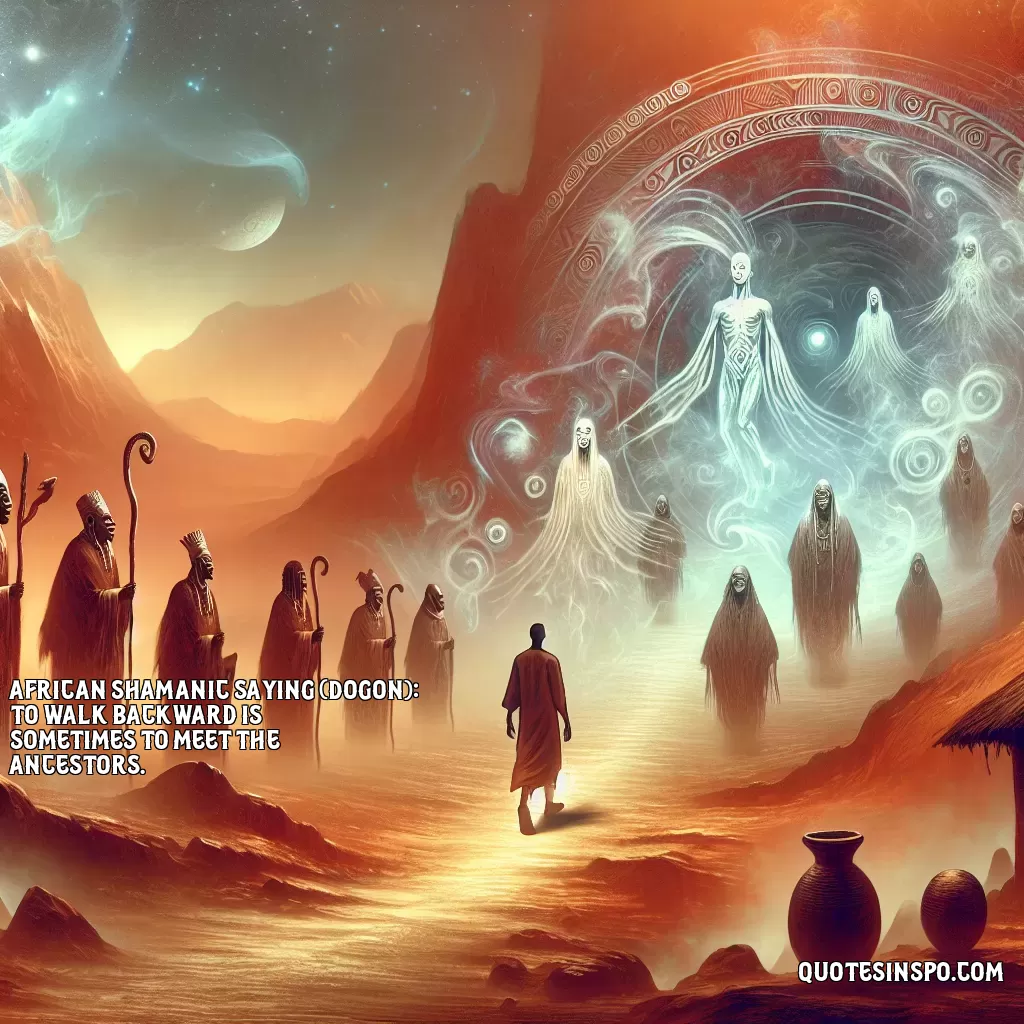
African Shamanic Saying (Dogon): To walk backward is sometimes to meet the ancestors.

African Shamanic Saying (Dogon): To walk backward is sometimes to meet the ancestors.
The quote "To walk backward is sometimes to meet the ancestors," attributed to the Dogon people, an ethnic group from Mali known for their rich cultural traditions and deep spiritual beliefs, offers a profound metaphor on connecting with one's roots and understanding the past. This saying embodies the concept that revisiting and reflecting on history and traditions can reconnect individuals with their lineage, providing wisdom and guidance from those who came before them. In a literal sense, walking backward suggests retracing steps to revisit where one has come from. Symbolically, it implies looking back at history, culture, and familial roots. The 'ancestors' here represent not only our familial progenitors but also the collective knowledge and values that have been passed through generations. They embody the wisdom, experiences, and lessons that continue to influence present and future generations. In many African and indigenous cultures, ancestors are seen as guardians and guides, integral to understanding one's identity and purpose. By metaphorically 'walking backward,' individuals engage in introspection, gaining insight into the traditions, struggles, and triumphs of their forebears. This introspection fosters a deeper understanding of current circumstances through historical context, leading to personal growth and wisdom. Moreover, the quote highlights the need to embrace cultural heritage and maintain a spiritual connection with the past. In our modern world, fast-paced changes and technological advancement often lead to a detachment from cultural roots. The Dogon saying serves as a reminder of the value found in pausing and 'walking backward' to honor and learn from the accumulated life experiences of ancestors. This backward walk isn't about regression but rather a strategic reflection to better navigate the future with the wisdom acquired from historical awareness.
Quote By: Dogon
**Dogon: A Guardian of Tradition**
The Dogon people, an ethnic group residing primarily in the central plateau region of Mali, are renowned for their rich cultural heritage and profound connection to astronomy, folklore, and art. With a population of around 800,000, the Dogon have captivated anthropologists and scholars due to their unique societal structures and beliefs. Their history is woven into the fabric of their everyday life, and their narratives reflect a deep-rooted respect for tradition that has been passed down through generations.
At the core of Dogon culture is a complex cosmology that intricately ties their beliefs about the universe to their agricultural practices and social life. The Dogon maintain a pivotal connection to the Sirius star system, with advanced astronomical knowledge that has puzzled and fascinated researchers. Scholars like Marcel Griaule and Germaine Dieterlen have documented the Dogon’s understanding of the stars, asserting that this knowledge may have been acquired long before modern astronomy was established. The Dogon’s celestial understanding, coupled with their intricate myths about creation and existence, showcases their exceptional worldview.
In addition to their astronomical insights, Dogon culture is characterized by remarkable artistic expression. Their sculptures, masks, and textiles are not merely aesthetic creations but are imbued with spiritual significance. The Dogon ritual festivals, particularly the Sigui, exemplify their deep appreciation for art as a communal celebration and a means of preserving history. These festivals are marked by traditional dances, music, and storytelling, reflecting the community's resilience and continuity.
Despite facing challenges from modern influences and environmental changes, the Dogon have sought to uphold their distinct identity. Anthropologist Barbara L. Varanasi has emphasized the importance of their social structures and adaptability in the face of globalization, recognizing the Dogon as a living testament to the importance of cultural preservation.
In conclusion, the Dogon people have maintained a vibrant and dynamic culture shaped by their unique worldview, artistic expression, and profound knowledge of the cosmos. Their legacy continues to inspire curiosity and admiration, making the Dogon an essential subject of study in understanding human culture and the interconnectedness of tradition and modernity.